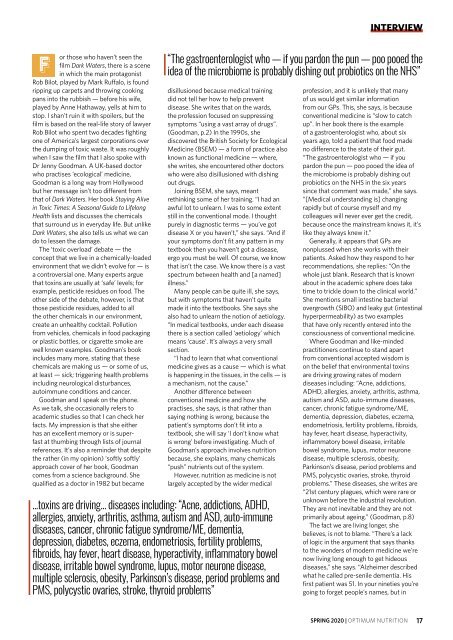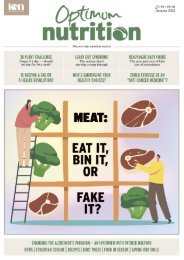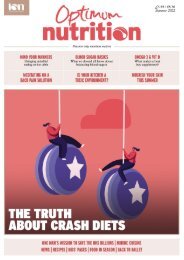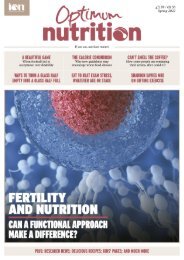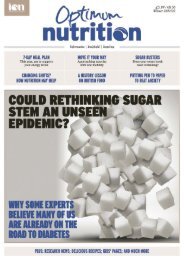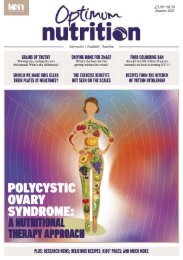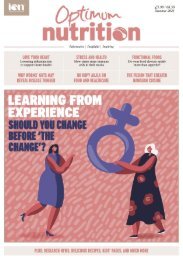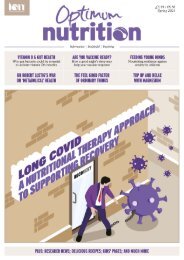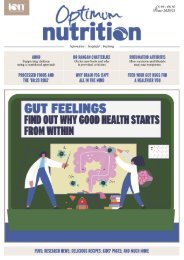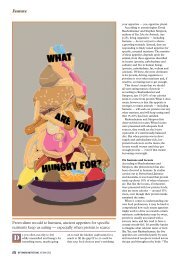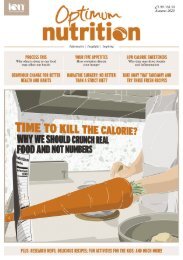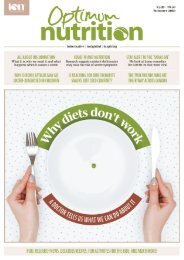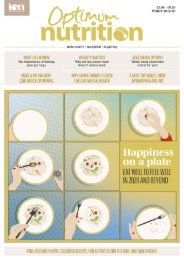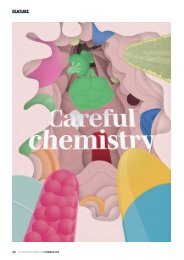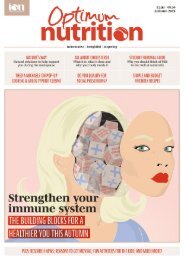Optimum Nutrition - Spring 2020 PREVIEW
Why your circadian rhythm is important for health and wellbeing | Age well to live well - what everyone over 40 (and younger) should know | The doctor who says our world is making us sick | Why junk food could be making your allergies worse | Making the most out of frozen fruit and veg | Could faecal transplants treat disease in the future? | Cannabidiol - should we say high to this new craze? | Plus kids' pages, recipes and more!
Why your circadian rhythm is important for health and wellbeing | Age well to live well - what everyone over 40 (and younger) should know | The doctor who says our world is making us sick | Why junk food could be making your allergies worse | Making the most out of frozen fruit and veg | Could faecal transplants treat disease in the future? | Cannabidiol - should we say high to this new craze? | Plus kids' pages, recipes and more!
You also want an ePaper? Increase the reach of your titles
YUMPU automatically turns print PDFs into web optimized ePapers that Google loves.
INTERVIEW<br />
F<br />
or those who haven’t seen the<br />
film Dark Waters, there is a scene<br />
in which the main protagonist<br />
Rob Bilot, played by Mark Ruffalo, is found<br />
ripping up carpets and throwing cooking<br />
pans into the rubbish — before his wife,<br />
played by Anne Hathaway, yells at him to<br />
stop. I shan’t ruin it with spoilers, but the<br />
film is based on the real-life story of lawyer<br />
Rob Bilot who spent two decades fighting<br />
one of America’s largest corporations over<br />
the dumping of toxic waste. It was roughly<br />
when I saw the film that I also spoke with<br />
Dr Jenny Goodman. A UK-based doctor<br />
who practises ‘ecological’ medicine,<br />
Goodman is a long way from Hollywood<br />
but her message isn’t too different from<br />
that of Dark Waters. Her book Staying Alive<br />
in Toxic Times: A Seasonal Guide to Lifelong<br />
Health lists and discusses the chemicals<br />
that surround us in everyday life. But unlike<br />
Dark Waters, she also tells us what we can<br />
do to lessen the damage.<br />
The ‘toxic overload’ debate — the<br />
concept that we live in a chemically-loaded<br />
environment that we didn’t evolve for — is<br />
a controversial one. Many experts argue<br />
that toxins are usually at ‘safe’ levels; for<br />
example, pesticide residues on food. The<br />
other side of the debate, however, is that<br />
those pesticide residues, added to all<br />
the other chemicals in our environment,<br />
create an unhealthy cocktail. Pollution<br />
from vehicles, chemicals in food packaging<br />
or plastic bottles, or cigarette smoke are<br />
well known examples. Goodman’s book<br />
includes many more, stating that these<br />
chemicals are making us — or some of us,<br />
at least — sick; triggering health problems<br />
including neurological disturbances,<br />
autoimmune conditions and cancer.<br />
Goodman and I speak on the phone.<br />
As we talk, she occasionally refers to<br />
academic studies so that I can check her<br />
facts. My impression is that she either<br />
has an excellent memory or is superfast<br />
at thumbing through lists of journal<br />
references. It’s also a reminder that despite<br />
the rather (in my opinion) ‘softly softly’<br />
approach cover of her book, Goodman<br />
comes from a science background. She<br />
qualified as a doctor in 1982 but became<br />
disillusioned because medical training<br />
did not tell her how to help prevent<br />
disease. She writes that on the wards,<br />
the profession focused on suppressing<br />
symptoms “using a vast array of drugs”.<br />
(Goodman, p.2) In the 1990s, she<br />
discovered the British Society for Ecological<br />
Medicine (BSEM) — a form of practice also<br />
known as functional medicine — where,<br />
she writes, she encountered other doctors<br />
who were also disillusioned with dishing<br />
out drugs.<br />
Joining BSEM, she says, meant<br />
rethinking some of her training. “I had an<br />
awful lot to unlearn. I was to some extent<br />
still in the conventional mode. I thought<br />
purely in diagnostic terms — you’ve got<br />
disease X or you haven’t,” she says. “And if<br />
your symptoms don’t fit any pattern in my<br />
textbook then you haven’t got a disease,<br />
ergo you must be well. Of course, we know<br />
that isn’t the case. We know there is a vast<br />
spectrum between health and [a named]<br />
illness.”<br />
Many people can be quite ill, she says,<br />
but with symptoms that haven’t quite<br />
made it into the textbooks. She says she<br />
also had to unlearn the notion of aetiology.<br />
“In medical textbooks, under each disease<br />
there is a section called ‘aetiology’ which<br />
means ‘cause’. It’s always a very small<br />
section.<br />
“I had to learn that what conventional<br />
medicine gives as a cause — which is what<br />
is happening in the tissues, in the cells — is<br />
a mechanism, not the cause.”<br />
Another difference between<br />
conventional medicine and how she<br />
practises, she says, is that rather than<br />
saying nothing is wrong, because the<br />
patient’s symptoms don’t fit into a<br />
textbook, she will say ‘I don’t know what<br />
is wrong’ before investigating. Much of<br />
Goodman’s approach involves nutrition<br />
because, she explains, many chemicals<br />
“push” nutrients out of the system.<br />
However, nutrition as medicine is not<br />
largely accepted by the wider medical<br />
...toxins are driving... diseases including: “Acne, addictions, ADHD,<br />
allergies, anxiety, arthritis, asthma, autism and ASD, auto-immune<br />
diseases, cancer, chronic fatigue syndrome/ME, dementia,<br />
depression, diabetes, eczema, endometriosis, fertility problems,<br />
fibroids, hay fever, heart disease, hyperactivity, inflammatory bowel<br />
disease, irritable bowel syndrome, lupus, motor neurone disease,<br />
multiple sclerosis, obesity, Parkinson’s disease, period problems and<br />
PMS, polycystic ovaries, stroke, thyroid problems”<br />
“The gastroenterologist who — if you pardon the pun — poo pooed the<br />
idea of the microbiome is probably dishing out probiotics on the NHS”<br />
profession, and it is unlikely that many<br />
of us would get similar information<br />
from our GPs. This, she says, is because<br />
conventional medicine is “slow to catch<br />
up”. In her book there is the example<br />
of a gastroenterologist who, about six<br />
years ago, told a patient that food made<br />
no difference to the state of their gut.<br />
“The gastroenterologist who — if you<br />
pardon the pun — poo pooed the idea of<br />
the microbiome is probably dishing out<br />
probiotics on the NHS in the six years<br />
since that comment was made,” she says.<br />
“[Medical understanding is] changing<br />
rapidly but of course myself and my<br />
colleagues will never ever get the credit,<br />
because once the mainstream knows it, it’s<br />
like they always knew it.”<br />
Generally, it appears that GPs are<br />
nonplussed when she works with their<br />
patients. Asked how they respond to her<br />
recommendations, she replies: “On the<br />
whole just blank. Research that is known<br />
about in the academic sphere does take<br />
time to trickle down to the clinical world.”<br />
She mentions small intestine bacterial<br />
overgrowth (SIBO) and leaky gut (intestinal<br />
hyperpermeability) as two examples<br />
that have only recently entered into the<br />
consciousness of conventional medicine.<br />
Where Goodman and like-minded<br />
practitioners continue to stand apart<br />
from conventional accepted wisdom is<br />
on the belief that environmental toxins<br />
are driving growing rates of modern<br />
diseases including: “Acne, addictions,<br />
ADHD, allergies, anxiety, arthritis, asthma,<br />
autism and ASD, auto-immune diseases,<br />
cancer, chronic fatigue syndrome/ME,<br />
dementia, depression, diabetes, eczema,<br />
endometriosis, fertility problems, fibroids,<br />
hay fever, heart disease, hyperactivity,<br />
inflammatory bowel disease, irritable<br />
bowel syndrome, lupus, motor neurone<br />
disease, multiple sclerosis, obesity,<br />
Parkinson’s disease, period problems and<br />
PMS, polycystic ovaries, stroke, thyroid<br />
problems.” These diseases, she writes are<br />
“21st century plagues, which were rare or<br />
unknown before the industrial revolution.<br />
They are not inevitable and they are not<br />
primarily about ageing.” (Goodman, p.8)<br />
The fact we are living longer, she<br />
believes, is not to blame. “There’s a lack<br />
of logic in the argument that says thanks<br />
to the wonders of modern medicine we’re<br />
now living long enough to get hideous<br />
diseases,” she says. “Alzheimer described<br />
what he called pre-senile dementia. His<br />
first patient was 51. In your nineties you’re<br />
going to forget people’s names, but in<br />
SPRING <strong>2020</strong> | OPTIMUM NUTRITION<br />
17


